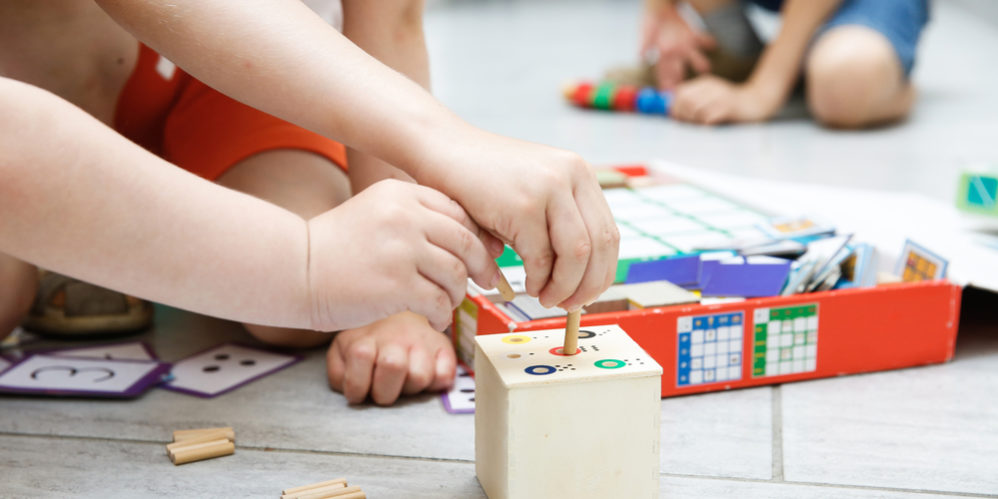When you take a peek into a Montessori classroom or read about the philosophies behind the teaching style, you will find that the Montessori Method is very unique. The Montessori Method, developed by Dr. Maria Montessori, is a child-centered approach to education, one that gives a child access to a comprehensive curriculum without the need for standardized tests and homework. Everything about the classroom is designed to be multi-sensory and hands-on, giving the aspect of play to all the tasks.
But that is just the beginning of what makes the Montessori Method unique.
The Open Mixed-Age Classroom
Unlike traditional schools where children are separated by age, based on what year they were born, the Montessori Method has age groups. The first group is 3-6 years old. It is thought that separating younger students from the older ones is a missed opportunity for developing social and leadership skills.
At 3 years old, a child’s mind is elastic and hungry for knowledge. In the Montessori classroom, they will experience language and math and practical skills from more than just the teacher. They get to interact with older students who are on their way to mastering more difficult challenges and will be inspired and guided by their mentors. For older students, this is a chance to show off what they know and feel a sense of pride in how much they’ve learned.
The Prepared Environment
A Montessori classroom is designed to be open and free within limits. It is organized in such a way that students can reach the materials they need to complete their work. Furthermore, all the tables, chairs, and utensils are child-sized. Students in a Montessori classroom are free to choose their own activities based on what is available on the shelves. Once they are done with a task or material, they return those items to their proper place before moving on.
Children come to understand the importance of an ordered environment all while satisfying their curiosity and learning about the world.
View this post on Instagram
Uninterrupted Work Periods
One of the hallmarks of the Montessori method are blocks of uninterrupted work time. If you are looking to enroll your child in a true Montessori school, make sure that their day isn’t too scheduled. There should be a full 3-hour section for work in the morning (or 2 hours for toddlers), at least.
These periods are integral to the Montessori Method, because they allow children enough time to engage with the materials and learn without needing to rush. When children are rushed, they can’t concentrate, and that hinders their development. With uninterrupted blocks of time to work, children can overcome challenges more quickly.
Distinct Learning Materials
One of the things parents are always amazed to see is a beautiful classroom for the children to explore. Everything from the furniture to the learning materials is made of a natural material. The shelves will be made of wood. You’ll see real plants sitting on window sills and maybe a rabbit or fish for the children to take care of. The dishes, utensils, and organizational trays are also natural.
There is a reason for this, as well. The Montessori Method understands that children will have more respect for materials when they are beautiful and well-maintained. Also, some of the items—like ceramic plates—are fragile for a reason. Children should gain real-life experience by handling real items. This makes the activity more purposeful and engaging.
Plus, when a child can master handling these items, they will feel a sense of accomplishment. They will know that they can do things for themselves without having to rely on an adult, and that will make all the difference when they are older.
The Educators
What is unique about the Montessori Method? You can’t overlook the teachers. Their role is much different to those who teach in a traditional setting. Montessori educators believe that, instead of hours giving seminars, it is better to let children teach themselves. Exploration, observation, role-playing, trial and error, and repetition are all crucial in a child’s development.
Therefore, the Montessori teacher acts more as a guide who gently steers the classroom one way or the other. They are often seen standing back from the students, observing the community rather than dictating what to do. The Montessori educator is a coach who demonstrates new skills and inspires creativity among the students.
If you want to enroll your children in a true Montessori school, look for teachers in the staff who have reached a certification in Montessori education. It also helps if the teachers have degrees in education, as well.
Conclusion
What is unique about the Montessori Method? Many things. Starting with the philosophy that education should be child-driven, Montessori has changed the way many schools teach their students. The mixed-age classroom, prepared environment, and comprehensive hands-on curriculum is very different from traditional education. But that is also exactly why a Montessori education is priceless.
Looking for a Montessori school in Philadelphia? Contact Fishtown Montessori today to schedule a virtual tour and see if our school is right for your child.






